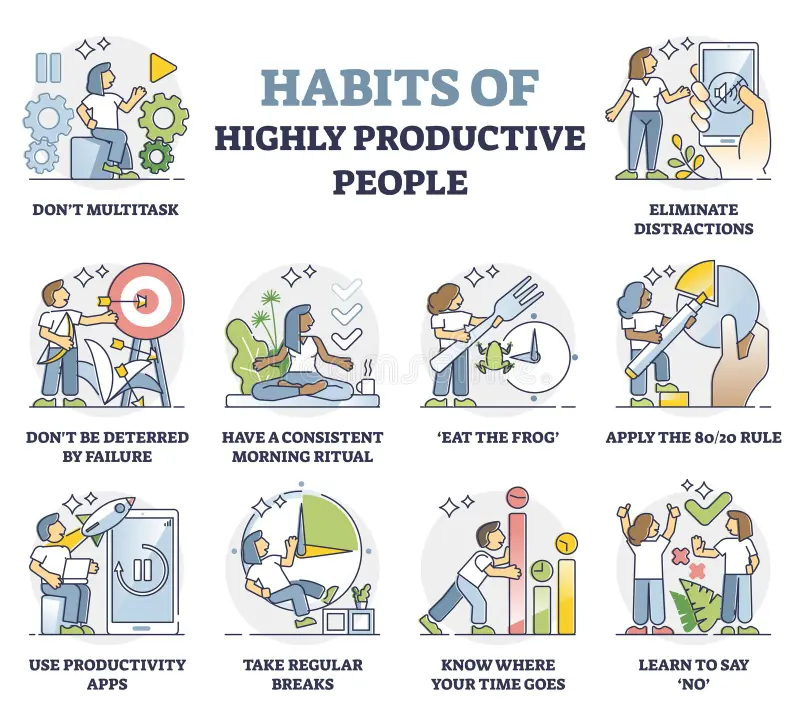
Top 10 Habits of Highly Productive People in 2025
As we enter 2025, productivity is being redefined. It’s no longer just about working longer hours or ticking off endless to-do lists. Today, true productivity is rooted in intention, resilience, and adaptability. Based on scientific findings and expert best practices, the Top 10 Habits of Highly Productive People in 2025 combine timeless principles with modern adaptations. This expert-led article explores these habits and offers actionable insights to help you thrive.
1. Strategic Time Blocking
Strategic time blocking involves assigning specific time segments to single tasks, reducing decision fatigue and boosting efficiency. Highly productive individuals plan their day with clear time allocations for focus, breaks, and deep work. This method, as supported by calendar-based productivity research, is linked to higher retention and performance gains . For example, dedicating 90 minutes first thing in the morning to your most important project—the 90/90/1 rule—can lead to substantial productivity gains.
2. Prioritize Deep Work Over Busy Work
Distraction is the enemy of progress. Highly productive people protect “deep work” periods—blocks of uninterrupted time to focus on high-impact tasks. Cal Newport’s framework encourages disconnecting from notifications and allocating such sessions consistently. Neuroscience shows that these periods significantly improve cognitive performance . Frequent interruptions cost our brain’s ability to refocus, making deep work essential.
3. Leverage AI and Smart Automation
In 2025, AI isn’t optional—it’s a productivity partner. Highly productive individuals delegate repetitive tasks—like scheduling, email filtering, and transcription—to AI tools such as ChatGPT, Zapier, and Otter. While AI increases efficiency, experts caution we still need human creativity for breakthrough thinking . Effective use of AI can reclaim hours each week.
4. Maintain Daily Mindfulness and Mental Hygiene
Top performers prioritize mental clarity through daily mindfulness. Practices like meditation, gratitude journaling, and digital detoxes have been shown to enhance emotional regulation and gray matter volume. By unplugging intentionally and reflecting, individuals avoid burnout and sustain their well-being long-term.
5. Optimize Physical Activity and Nutrition
Physical health is a key foundation for mental performance. Regular exercise, hydration, and balanced nutrition support improved mood, memory, and focus. Top achievers integrate fitness routines like HIIT, walking 9,000 steps daily, or morning yoga sessions. Consistent productivity is intertwined with physical resilience.
6. Set Precise Goals and Structure Progress
Goal precision transforms ambition into action. Productive individuals use frameworks like SMART goals and OKRs (Objectives and Key Results) to create clarity and measurable progress . Breaking long-term goals into monthly, weekly, and daily tasks fosters momentum. Weekly self-audits—assessing wins and gaps—promote accountability.
7. Embrace Lifelong Learning and Growth Mindset
Continuous learning keeps you adaptable. High performers consistently read, take courses, seek mentors, and reflect. Cultivating a growth mindset—believing skills can be developed—correlates with higher performance, creativity, and resilience .
8. Say “No” and Build Environmental Systems
An efficient system beats intermittent willpower. Rather than relying on motivation, highly productive people shape their environments—applying tools like website blockers, email batching, and distraction-free zones. Importantly, they also practice saying “no” strategically to maintain focus and uphold boundaries.
9. Prioritize Sleep and Recovery
Full-throttle effort doesn’t mean sacrifice recovery. Sleep is essential for memory, decision-making, and brain regeneration. Top performers aim for 7–9 hours nightly, supplementing with naps or rest rituals. Optimizing sleep hygiene—like avoiding screens before bedtime—supports sustainable productivity.
10. Use the Two-Minute Rule and Frequent Breaks
Small habits accumulate. The “two-minute rule” urges immediate action on tasks taking less than two minutes—a lever against procrastination. Complementarily, research supports periodic breaks to boost creative thinking, memory retention, and wellness .
FAQs
What are the Top 10 Habits of Highly Productive People in 2025?
They are: Strategic time blocking, deep work prioritization, AI automation, mindfulness, fitness and nutrition, precise goal setting, lifelong learning, environmental systems, sleep prioritization, and micro-actions via two-minute rule and breaks.
How long does a habit take to form?
On average, research shows it takes about 66 days to solidify a habit—but sustainability is key .
Does AI really help productivity?
Yes and no. While AI reduces repetitive work and increases efficiency, human creativity and original innovation remain decisive ft.com.
Can mindfulness impact productivity?
Definitely. Mindfulness enhances brain structure, emotional regulation, and focus, which are essential for sustained performance .
What should I do if I can’t maintain all habits?
Start small. Pick one or two habits—like time blocking and mindfulness—and gradually expand. Consistency beats binge effort.
Final Thoughts
In 2025, being productive isn’t about hustle—it’s about harmony. The Top 10 Habits of Highly Productive People in 2025 are grounded in science and shaped by modern realities. They emphasize smart planning, mental and physical well-being, and strategic leverage of digital tools.
By weaving these proven habits into your daily life—and adapting them to your unique needs—you can achieve consistent performance without compromising clarity or creativity. Start with one habit, iterate, and build your personal system, not just motivation.











